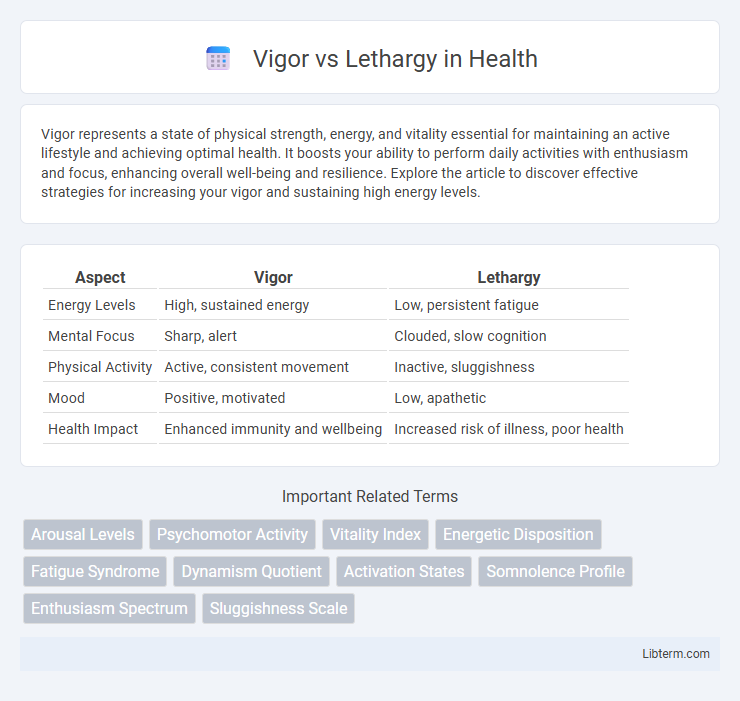Vigor represents a state of physical strength, energy, and vitality essential for maintaining an active lifestyle and achieving optimal health. It boosts your ability to perform daily activities with enthusiasm and focus, enhancing overall well-being and resilience. Explore the article to discover effective strategies for increasing your vigor and sustaining high energy levels.
Table of Comparison
| Aspect | Vigor | Lethargy |
|---|---|---|
| Energy Levels | High, sustained energy | Low, persistent fatigue |
| Mental Focus | Sharp, alert | Clouded, slow cognition |
| Physical Activity | Active, consistent movement | Inactive, sluggishness |
| Mood | Positive, motivated | Low, apathetic |
| Health Impact | Enhanced immunity and wellbeing | Increased risk of illness, poor health |
Understanding Vigor: Definition and Importance
Vigor refers to a state of physical strength, energy, and mental alertness that enhances productivity and overall well-being. It plays a crucial role in enabling individuals to perform daily tasks efficiently, overcome challenges, and maintain motivation. Understanding vigor is essential for developing strategies to boost health, optimize performance, and sustain long-term vitality.
What is Lethargy? Signs and Symptoms
Lethargy is a state of physical and mental sluggishness characterized by a lack of energy, decreased alertness, and reduced motivation to perform daily activities. Common signs and symptoms include persistent fatigue, drowsiness, slow speech or movement, difficulty concentrating, and a general sense of weakness. Identifying lethargy promptly is crucial for addressing underlying conditions such as infections, chronic illnesses, or neurological disorders.
Causes of Vigor: Factors that Boost Energy
Natural sunlight exposure enhances circadian rhythms, resulting in increased energy levels and improved mood. Regular physical activity boosts mitochondrial function and circulation, promoting sustained vigor throughout the day. Nutrient-rich diets, particularly those high in complex carbohydrates, proteins, and essential vitamins, support optimal cellular energy production and mental alertness.
Common Causes of Lethargy
Lethargy often results from common causes such as sleep deprivation, poor nutrition, dehydration, and underlying medical conditions like hypothyroidism or anemia. Chronic stress and mental health disorders, including depression and anxiety, contribute significantly to feelings of persistent tiredness and low energy. Identifying these factors is crucial for differentiating lethargy from vigor and restoring optimal physical and mental performance.
Physical Health: Impact on Vigor and Lethargy
Physical health significantly influences levels of vigor and lethargy, where proper nutrition, regular exercise, and sufficient sleep enhance energy and overall vitality. Chronic illness, poor diet, and sedentary lifestyles contribute to lethargy by reducing metabolic efficiency and muscle strength. Maintaining cardiovascular health and balanced hormone levels directly supports sustained physical vigor and reduces fatigue.
Mental Well-being: Psychological Roots
Vigor in mental well-being stems from balanced neurotransmitter function and adaptive cognitive patterns, fostering resilience and motivation. Lethargy often arises from dysregulated serotonin and dopamine levels, linked to depressive symptoms and cognitive fatigue. Psychological roots include chronic stress, unresolved trauma, and negative thought cycles impacting mental energy and vitality.
Lifestyle Choices: Diet, Exercise, and Rest
Vigor thrives on a balanced diet rich in whole foods, regular exercise that promotes cardiovascular health and muscle strength, and consistent restorative rest to support recovery and energy levels. Lethargy often results from poor nutritional choices high in processed sugars and unhealthy fats, sedentary habits leading to diminished physical fitness, and irregular or insufficient sleep disrupting the body's natural repair processes. Prioritizing nutrient-dense meals, daily physical activity, and quality sleep establishes the foundation for sustained energy and vitality.
Overcoming Lethargy: Practical Strategies
Combating lethargy requires practical strategies such as establishing a consistent sleep schedule, incorporating regular physical activity, and maintaining a balanced diet rich in essential nutrients like iron and B vitamins. Hydration and reducing caffeine or sugar intake also play critical roles in boosting energy levels. Implementing short breaks during work and practicing mindfulness techniques enhance mental clarity, helping to restore vigor effectively.
Sustaining Vigor: Habits for Lasting Energy
Sustaining vigor relies on consistent habits like regular physical activity, balanced nutrition rich in vitamins and antioxidants, and adequate sleep cycles promoting cellular repair. Maintaining hydration and managing stress through mindfulness techniques enhance mitochondrial efficiency, directly supporting lasting energy. Prioritizing these routines optimizes metabolic function and combats lethargy, ensuring sustained vitality throughout the day.
Vigor vs Lethargy: Key Takeaways for a Vibrant Life
Vigor vs lethargy significantly influences physical health, mental clarity, and overall productivity, where vigor promotes energy, motivation, and resilience, while lethargy triggers fatigue, decreased focus, and reduced motivation. Strategies to enhance vigor include regular exercise, balanced nutrition, and sufficient sleep, which collectively boost metabolism, cognitive function, and emotional well-being. Understanding and managing this dynamic supports a vibrant life by fostering sustained energy levels and optimal performance across daily activities.
Vigor Infographic

 libterm.com
libterm.com